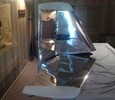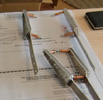


random user submitted photo
Lightweight Battery
30 posts
• Page 1 of 3 • 1, 2, 3
Lightweight Battery
Someone on the Yahoo Groups asked about batteries, so I did a search on lightweight batteries and found that Lithium-Ion batteries are starting to become available that have the same capacity as conventional batts but weigh less than half as much! For example:
http://www.shoraipower.com/p-210-lfx36l3-bs12.aspx
540 Cold Crank Amps, and 36Ah reserve capacity...for under five pounds!! Expensive, yes ($350), but you are shaving 5-8lb off your overall and FWF weights for that money, which is not insignificant. I sent Kerry at Sonex an e-mail asking if they had a problem with this battery type, and here's his response:
So it looks like as long as the battery specs are up to the task, Sonex is cool with it. :D
http://www.shoraipower.com/p-210-lfx36l3-bs12.aspx
540 Cold Crank Amps, and 36Ah reserve capacity...for under five pounds!! Expensive, yes ($350), but you are shaving 5-8lb off your overall and FWF weights for that money, which is not insignificant. I sent Kerry at Sonex an e-mail asking if they had a problem with this battery type, and here's his response:
We do not have specific battery needs beyond those of the engines and instruments so any battery you feel you would like to use is fair game.
So it looks like as long as the battery specs are up to the task, Sonex is cool with it. :D
Last edited by Andy Walker on Thu Aug 04, 2011 10:43 am, edited 1 time in total.
-

Andy Walker - Posts: 375
- Joined: Sat Jul 02, 2011 10:27 pm
Re: Lightweight Battery
That is impressive.
Mike
I know but one freedom, and that is the freedom of the mind.
Antoine de Saint-Exupery
Reserved C-FONX for the 80th Onex,Hummel 85HP ,Tri gear,GRT Mini X EFIS,and EMS,iFly 740 GPS
I know but one freedom, and that is the freedom of the mind.
Antoine de Saint-Exupery
Reserved C-FONX for the 80th Onex,Hummel 85HP ,Tri gear,GRT Mini X EFIS,and EMS,iFly 740 GPS
-

Mike53 - Posts: 482
- Joined: Mon Jun 20, 2011 10:00 pm
- Location: Dutton,Ontario , Canada
Re: Lightweight Battery
Are you sure that they can be a drop in replacement for lead acid type batteries. The last I knew, lithium ion batteries had very different charging requirements and could not direclty be hooked up to an alternator/regulator setup. There is more to it than just cold cranking amps.
Keith
#554
Keith
#554
- kmacht
- Posts: 759
- Joined: Tue Jun 21, 2011 11:30 am
Re: Lightweight Battery
kmacht wrote:Are you sure that they can be a drop in replacement for lead acid type batteries. The last I knew, lithium ion batteries had very different charging requirements and could not direclty be hooked up to an alternator/regulator setup. There is more to it than just cold cranking amps.
Keith
#554
They are marketed for performance cars, which are similar 12V systems. I'm not an electrical engineer, but it seems if it would work for one it would work for the other.
-

Andy Walker - Posts: 375
- Joined: Sat Jul 02, 2011 10:27 pm
Re: Lightweight Battery
We ham guys are looking at LiFePO4 batteries as safer on charge and discharge. They are used extensively in electric bicycles. (Local battery places - Batties Plus etc don't know what I am talking about when I ask for them) - Hams are beginning to use them in backpack HF radio setups. I am just an observer so far. I am keeping the charge up on my Odessey (sp) battery in the motorglider with PV. I am VERY interested in light, reliable batteries. Keith has a point - different chemistries of batteries can charge and discharge quite differently - need to check in to it.
Ted Xenos 32
Dragon Lady Bug
Ted Xenos 32
Dragon Lady Bug
- XenosTed
- Posts: 20
- Joined: Tue Aug 23, 2011 9:16 pm
- Location: Athens GA USA
Re: Lightweight Battery
The Shorai battery shown in the first post is a "lithium-IRON" battery...not a lithium-ION battery.
One supplier says they are a drop in replacement for lead acid: http://www.batterystuff.com
"The Lithium Iron Phosphate battery is the ultimate in weight versus power technology. This battery weighs in at only 1.01 pounds and offers an incredible 102 C.C.A. This is a drop in replacement for your Lead-acid battery, and will require no change to your stock charging system."
They have the Shorai batteries cheaper.
One supplier says they are a drop in replacement for lead acid: http://www.batterystuff.com
"The Lithium Iron Phosphate battery is the ultimate in weight versus power technology. This battery weighs in at only 1.01 pounds and offers an incredible 102 C.C.A. This is a drop in replacement for your Lead-acid battery, and will require no change to your stock charging system."
They have the Shorai batteries cheaper.
- radfordc
- Posts: 573
- Joined: Fri Jun 03, 2011 9:39 am
Re: Lightweight Battery
Here is a tutorial:
Lithium Battery Overview
Lithium Based batteries are quickly becoming a reasonable replacement for the 150 year old technology of Lead-Acid batteries. In applications where weight is a consideration, Lithium batteries are among the lightest options available. In recent years Lithium has become available in several chemistries; Lithium-Ion, Lithium Iron Phosphate, Lithium Polymer and a few more exotic variations.
Lithium-Iron-Phosphate particleLiFePO4 (also known as Lithium Iron Phosphate) batteries are a huge improvement over lead acid in weight, capacity and shelf life. The LiFePO4 batteries are the safest type of Lithium batteries as they will not overheat, and even if punctured they will not catch on fire. The cathode material in LiFePO4 batteries is not hazardous, and so poses no negative health hazards or environmental hazards. Due to the oxygen being bonded tightly to the molecule, there is no danger of the battery erupting into flames like there is with Lithium-Ion. The chemistry is so stable that LiFePO4 batteries will accept a charge from a lead-acid configured charger. Though less energy-dense than the Lithium-Ion and Lithium Polymer, Iron and Phosphate are abundant and cheaper to extract so costs are much more reasonable. LiFePO4 life expectancy is approximately 5-7 years.
Lithium-Ion batteries and Lithium Polymer batteries are the most energy dense of the Lithium batteries, but they are lacking in safety. The most common type of Lithium-Ion is LiCoO2, or Lithium Cobalt Oxide. In this chemistry, the oxygen is not strongly bonded to the cobalt, so when the battery heats up, such as in rapid charging or discharging, or just heavy use, the battery can catch fire. This could be especially disastrous in high pressure environments such as airplanes, or in large applications such as electric vehicles. To help counteract this problem, devices that use Lithium-Ion and Lithium Polymer batteries are required to have extremely sensitive and often expensive electronics to monitor them. While Lithium Ion batteries have an intrinsically high energy density, after one year of use the capacity of the Lithium Ion will have fallen so much that the LiFePO4 will have the same energy density, and after two years LiFePO4 will have significantly greater energy density. Another disadvantage of these types is that Cobalt can be hazardous, raising both health concerns and environmental disposal costs. The projected life of a Lithium-Ion battery is approximately 3 years from production.
Lead Acid is a proven technology and can be relatively cheap. Because of this they are still used in the majority of electric vehicle applications and starting applications. Compared to Lead-Acid batteries the only disadvantage of the LiFePO4 batteries is that they really do not perform well below about 0 degrees Celsius. However, since capacity, weight, operating temperatures and CO2 reduction are large factors in many applications, LiFePO4 batteries are quickly becoming an industry standard. Although the initial purchase price of LiFePO4 is higher than lead acid, the longer cycle life can make it a financially sound choice.
Lithium Battery Overview
Lithium Based batteries are quickly becoming a reasonable replacement for the 150 year old technology of Lead-Acid batteries. In applications where weight is a consideration, Lithium batteries are among the lightest options available. In recent years Lithium has become available in several chemistries; Lithium-Ion, Lithium Iron Phosphate, Lithium Polymer and a few more exotic variations.
Lithium-Iron-Phosphate particleLiFePO4 (also known as Lithium Iron Phosphate) batteries are a huge improvement over lead acid in weight, capacity and shelf life. The LiFePO4 batteries are the safest type of Lithium batteries as they will not overheat, and even if punctured they will not catch on fire. The cathode material in LiFePO4 batteries is not hazardous, and so poses no negative health hazards or environmental hazards. Due to the oxygen being bonded tightly to the molecule, there is no danger of the battery erupting into flames like there is with Lithium-Ion. The chemistry is so stable that LiFePO4 batteries will accept a charge from a lead-acid configured charger. Though less energy-dense than the Lithium-Ion and Lithium Polymer, Iron and Phosphate are abundant and cheaper to extract so costs are much more reasonable. LiFePO4 life expectancy is approximately 5-7 years.
Lithium-Ion batteries and Lithium Polymer batteries are the most energy dense of the Lithium batteries, but they are lacking in safety. The most common type of Lithium-Ion is LiCoO2, or Lithium Cobalt Oxide. In this chemistry, the oxygen is not strongly bonded to the cobalt, so when the battery heats up, such as in rapid charging or discharging, or just heavy use, the battery can catch fire. This could be especially disastrous in high pressure environments such as airplanes, or in large applications such as electric vehicles. To help counteract this problem, devices that use Lithium-Ion and Lithium Polymer batteries are required to have extremely sensitive and often expensive electronics to monitor them. While Lithium Ion batteries have an intrinsically high energy density, after one year of use the capacity of the Lithium Ion will have fallen so much that the LiFePO4 will have the same energy density, and after two years LiFePO4 will have significantly greater energy density. Another disadvantage of these types is that Cobalt can be hazardous, raising both health concerns and environmental disposal costs. The projected life of a Lithium-Ion battery is approximately 3 years from production.
Lead Acid is a proven technology and can be relatively cheap. Because of this they are still used in the majority of electric vehicle applications and starting applications. Compared to Lead-Acid batteries the only disadvantage of the LiFePO4 batteries is that they really do not perform well below about 0 degrees Celsius. However, since capacity, weight, operating temperatures and CO2 reduction are large factors in many applications, LiFePO4 batteries are quickly becoming an industry standard. Although the initial purchase price of LiFePO4 is higher than lead acid, the longer cycle life can make it a financially sound choice.
- radfordc
- Posts: 573
- Joined: Fri Jun 03, 2011 9:39 am
Re: Lightweight Battery
radfordc wrote:The Shorai battery shown in the first post is a "lithium-IRON" battery...not a lithium-ION battery.
I'm noticed that too...I'm assuming it's an Asian company and that is a typo.
EDIT: whoops, from post above I am dead wrong.
-

Andy Walker - Posts: 375
- Joined: Sat Jul 02, 2011 10:27 pm
Re: Lightweight Battery
I have install a Lithium battery in my Waiex. Cost around A$268.00. 500CCA. 3lbs. :) http://www.ballisticparts.com/products/batteries/16cell.php


Peter Henry
W#149
W#149
-

phenry - Posts: 59
- Joined: Tue Nov 22, 2011 11:29 pm
- Location: Newborough Vic. Australia
Re: Lightweight Battery
Looks great! I'm still on the fence, but saving 10+ lbs is a compelling argument to consider these newer battery types. From what I've read, these are fairly safe...the 2 issues that I'm still weighing are 1) They provide little warning before running out of juice...my understanding is a volt meter won't help identifying when these batteries are dying, but that an ammeter may help and 2) Their operating temperature range is usually below our cowl temperatures...not sure if this is an issue or not....
I'm about ready to make by battery box, so I guess I'll need to decide pretty soon :)
I'm about ready to make by battery box, so I guess I'll need to decide pretty soon :)
Frank Alvarez
Sonex #800, Aerovee 2.1
Scratch Building (working on Cowl)
Sonex #800, Aerovee 2.1
Scratch Building (working on Cowl)
- falvarez
- Posts: 143
- Joined: Wed Sep 28, 2011 2:30 pm
- Location: Middleburg, FL
30 posts
• Page 1 of 3 • 1, 2, 3
Who is online
Users browsing this forum: No registered users and 10 guests







